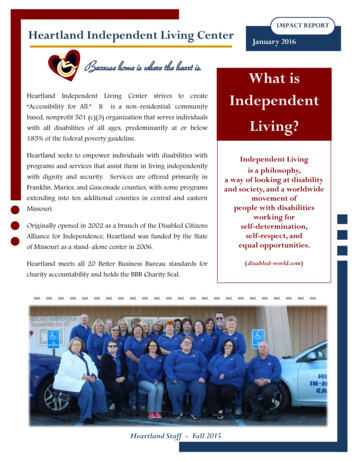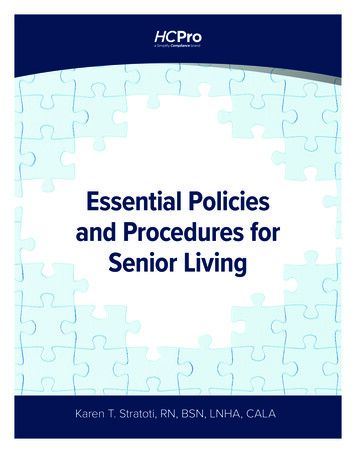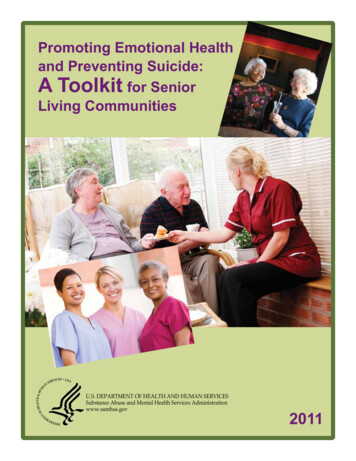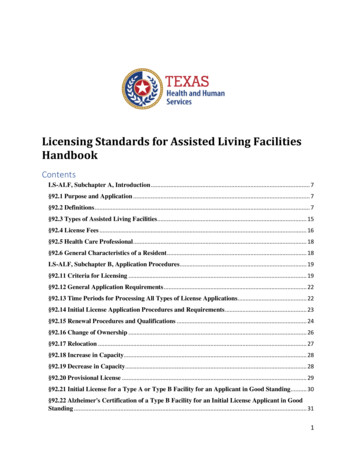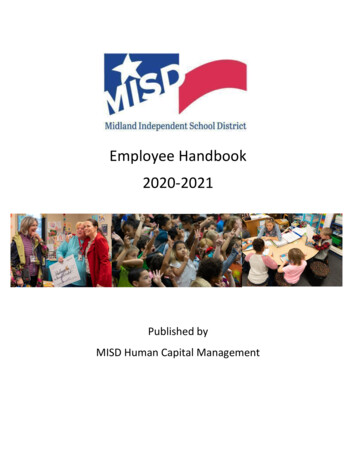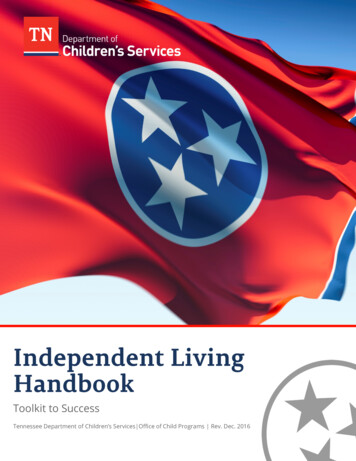
Transcription
Independent LivingHandbookToolkit to SuccessTennessee Department of Children’s Services Office of Child Programs Rev. Dec. 2016
Toolkit to SuccessIf you are a Tennessee youth in custody or getting ready to leave foster care, this handbook is for you. Itcovers issues identified as important by youth who have been through the system and by individuals whowork closely with youth in the foster care system. This handbook offers many resources and websites to helpyou navigate life—both during and after foster care. It does not cover every issue you may face during yourtransition to adulthood, but it will answer some of your questions about leaving care such as getting andkeeping a job, paying for school, finding housing, and receiving health care services.This handbook is just a starting point. You should review the handbook with your foster care caseworker,Independent Living Specialist, or community-based provider as early as age 14, so he or she can help you withquestions about the resources in this handbook. Also, please note that some of the resources listed maychange because of funding or program changes.The Youth Handbook can be viewed and downloaded at ition/yit/resources-for-youth.html or on the SWORPS website at www.sworps.utk.edu/children/.Did you know that you can find FREE access to internet at public libraries? Visit yourlocal public library if you need internet access to use the online resources included inthis handbook.
AcknowledgementsWe owe a special thanks to youth from Shelby County, Middle TN and East Tri- Regional Youth Boards for theirparticipation in focus groups and for sharing their experiences in foster care. These young men and womenprovided us with valuable information about support services needed to help young people achieve selfsufficiency and avoid many of the pitfalls for which they are at risk. Tennessee’s Department of Children’sServices is also grateful to current and aged out foster care youth, the DCS Independent Living staff,UTSWORPS, AOC and the Citizens Review Panel for their feedback and recommendations. Thanks to the LegalAid Society for letting us reprint information from their easy-to-read brochures about the law. Also, thanks toKidCentral (http://kidcentraltn.com/) for letting us reprint information from their family-focused website.
Table of ContentsA Guide for Teens in Foster CareGetting Involved in Your CommunityRecreational ActivitiesVolunteer ActivitiesFoster ClubResource CentersFinancial EducationLife Skills ClassesYouth 4 Youth BoardsDocuments to Get When Leaving Foster CareBirth CertificateSocial Security CardMedical and School RecordsTennessee Driver’s LicenseTennessee Identification CardFoster Care RecordsVoter Registration CardSelective Service SystemOther Documents and InformationHelp for Your Transition Out of Foster CareHealth InsuranceIndependent Living Program ServicesTemporary Assistance for Needy Families (TANF) Families FirstSupplemental Nutrition Assistance Program (SNAP)Child Care ServicesSocial Security Administration BenefitsLGBTQ ResourcesManaging Your MoneyOpening a Bank AccountHow to Choose a BankWays to Manage Your Checking AccountCredit CardsChecking Your CreditAvoiding Predatory LendingBudgeting MoneyBuying a CarCar InsuranceFinding a Place to LiveSchool HousingLiving with a RoommateSearching for a Place to LiveSubsidized Housing and Rent Assistance ProgramsPicking the Right PlaceRenter’s Rights and TipsTaking Care of Your Body and MindPersonal CareHealthy 5161617181820212121222222232323
Eating DisordersFatigue and Sleep DisordersHealthy RelationshipsDomestic ViolenceSexually Transmitted Diseases (STDs)Birth Control and Family PlanningMental HealthPsychotropic MedicationsSelf-EsteemSuicide PreventionLearning Today for a Better TomorrowHigh SchoolEducational Opportunities After High SchoolPaying for SchoolOther Ways to Get Job TrainingJoining the WorkforceFinding a JobApplying for a JobInterviewing for a JobCriminal HistoryAccepting a JobEmployee RightsPaying TaxesGetting Help with Legal IssuesLegal AidImmigrationStaying SafeOnline SafetyCyberbullyingHuman TraffickingAppendicesAppendix A: Independent Living Staff Contact ListAppendix B: Getting Ready for College To-Do ListAppendix C: Sample ResumeAppendix D: Successful InterviewingAppendix E: Psychotropic Medication – What Information Do I 5464646474747485050515253542
A Guide for Teens in Foster CareFoster Care is NOT the end of the world. Youth in foster care should be empowered to makedecisions about their lives. Here are some important things you should be able to expect. If this isnot true for you, talk to your F Parents, Family Service Worker, or Guardian ad Litem (GAL) aboutwhat is right for you.1. You should live in a safe, comfortable home.You should: Have enough clothes and healthy food.Have your own place to store your belongings.Talk to your resource parents about respect and privacy, includingwith whom they share informationabout you.Contact and spend time with people who do not live in your fosterhome or who are not in the foster care system (like friends,church members, teachers, and others).Make contact with your Family Service Worker, attorney/GAL,probation officer, CASA volunteers, foster youth advocates andsupporters, or anyone else involved with your case.Obtain a state photo ID.Be told about your placement by your Family Service Worker.Voice your opinion and be empowered.Be treated equally and with respect.Be accepted and not rejected.Fulfill your potential2. You should be able to keep in touch with family and friends.You can: Visit and contact brothers and sisters (unless a judge says you cannot).Contact parents and other family members (unless a judge says you cannot).Live with a family member if that would be a safe place.3. You should be able to pursue your education, interests, and enrichment.You should: Go to school regularly.Pursue vocational or college education.Attend after-school activities appropriate for your age and development level.Get help with school if needed.Request a parent-teacher conference to talk about what’s best for you academically.Participate in age-appropriate extracurricular, enrichment, and social activities such ascommunity activities, church, sports, scouting, 4-H, and prom.Attend gatherings and functions with the Resource Parent’s permission without directsupervision.1
Learn job skills right for your age.Find employment unless the law says you are too young.Manage the money you earn (if right for your age and developmental level).Have a checking or savings account.Attend life skills classes and activities if you are old enough.Have access to essential documents when leaving care (State ID/Driver’s license, Social securitycard, birth certificate, medical records, health insurance information, etc.).If you are over 14, have annual credit checks and learn about credit.4. You should have your health needs met.You should: See a doctor, dentist, eye doctor, or counselor if needed.Access your health records.5. You should have a voice.You can: Go to court and talk to the judge.See, and receive a copy of, your court report and your permanency plan.Keep your court records private (unless the law says otherwise).Request updates from your Family Service Worker and your attorney regarding changes in yourplan or placement.Tell the judge how you feel about your family, attorney, and Family Service Worker.Tell the judge what outcome you prefer.Have input about your plan and goals.Have the option to invite support people to Child and Family Team Meetings.Additionally, you should expect: To be held accountable for your actions.To follow rules and obey the law.To be respectful.That some of the items and activities on this list can only happen if you have built trust withyour Resource Parents, Family Service Worker, and others.To be allowed to maintain or develop relationships with appropriate people who are importantto you, as long as it’s in your best interest. No one should leave foster care without apermanent, caring relationship with an adult. Speak with your Family Service Worker aboutwho is important in your life.2
In Foster Care, you should live a life free from abuse and discrimination.No one should: Lock you in a room.Abuse you physically, sexually, or emotionally forany reason.Punish you by physically hurting you for anyreason.Look through your things (unless they have agood and legal reason).Discriminate against you because of your sex,race, color, religion, sexual orientation, genderidentity, or for any other reason. If you are alesbian, gay, bisexual, transgender, or questioningyouth, your rights and protections include notbeing subjected to discrimination or harassmenton the basis of your actual, or perceived, sexualorientation or gender identity.Make you participate in any type of sexual activityby force, intimidation, or coercion, or in exchangefor, or a promise of money, goods, or services.Contact your Family Service Worker if you have concerns about the way you are being treated.To view the online version of the Guide for Teens in Foster Care visit foster-care.html.Getting Involved in Your CommunityYouth are encouraged to get involved in community and recreational activities. It’s up to you to make goodchoices about how you spend your time. Take time to enjoy yourself, visit with the people you care about,meet new people, accept challenges that will help you achieve your goals, and get involved in service projects.Don’t just sit home watching TV or playing computer games; instead, get involved in your community.Recreational ActivitiesEvery city and county in Tennessee has low-cost or free activities where you can meet new people andparticipate in things that interest you. Here are some ideas: Join a community sports league. If you like basketball, baseball, soccer, tennis, or football, join yourcommunity league. These activities are offered by your city or county parks department, faith-basedorganizations, or private companies. Check your local newspaper or city paper. The paper is available online and often has an eventscalendar or entertainment section that lists fun things to do in your area. Read the Thursday or Fridaypaper to learn about activities for the weekend or upcoming events.3
Check with your local county parks and recreation department or community recreationcenters. Many offer a wide range of classes in the arts, various sports, and other related activities. Contact your local public library. They will be able to share with you information about free or lowincome resources in your community. Contact your city or county school district office. Look for community classes on everything fromcooking to dance to swim lessons. Check social media sites for upcoming events. Social media sites like Facebook and Twitter canhave information about events in your community.Volunteer OpportunitiesVolunteering for a cause you care about can be rewarding. It’s also a great way to build your resume forcollege, meet people who can help you get a job, make friends, and use your talents to help others. Call 211 orcontact your local library to find volunteer opportunities near you. You can volunteer your time in manydifferent ways: Join a local or national political campaign or organization. Join a local organization that supports former foster care youth. Register people to vote. Mentor other children or youth. Teach senior citizens how to surf the Internet. Read to people who are blind. Volunteer at a local museum. Volunteer at a local animal shelter. Bring comfort and happiness to persons in a nursing home. Schools are a great way to get involved in the community. Some activities that can be included forvolunteer opportunities are sports, choir, school fundraising events, tutoring (peer-to-peer), danceteam, debate team (if the school offers this) and any other extracurricular activities that may be usedto be involved.Foster ClubFoster Club offers online services that allow current and former foster youth to ask questions and connectwith others who share similar experiences. Visit www.fosterclub.com or the Tennessee Foster Club Chapter atwww.fosterclub.com/groups/tennessee.4
Resource CentersThe Jim Casey Youth Opportunity Initiatives Resource Centers serves young people between the ages of 14and 26 who have spent at least one day in foster care after the age of 14. Each location provides financialeducation, life skills classes, and help building connections in the community. Our 4 current locations are: Memphis- South Memphis Alliance- Dream Seekers: (901) 774-9582 fb-SMA Nashville- Monroe Harding- Youth Connections: (615) 226-3614 Knoxville- Helen Ross McNabb- Project NOW: (865) 524-7483 Chat10.5 tanooga- Partnership- I.A.M Ready Chattanooga: (423) 643-6444fb-MhYcfb-Project NOWFinancial EducationThe Opportunity Passport , our financial education program, provides financial education and helpsparticipants obtain experience with the banking system. There are many services available, including afinancial education curriculum that teaches financial basics such as: savings, asset building, credit, creditreports, money management, budgeting, etc. Participants can also receive assistance opening a bank account,including an IDA account. IDA accounts are matched savings accounts that help you save towards thepurchase of a lifelong asset, such as a home, car, computer or stocks. Participants are encouraged andsupported as they make savings contributions towards an asset purchase of their choice in one of thefollowing areas: Housing, Education/Training, Microenterprise, Vehicle, Medical/Dental costs, Investments,Credit Building, Debt Reduction, or Participant-Specific 1,000 per year ( 3,000 lifetime) towards their assetpurchase.Life Skills ClassesLife skills classes are offered on a regular basis, through both internal and external sources, such as referringparticipants to trainings available through a community partner. Life skills classes cover topics important tosuccessful independence and are provided based on identified needs often chosen by the participant. If youare interested, please contact EI DCS Independent Living Referral@tn.govYouth 4 Youth BoardsYou are a natural resource to advocate on behalf of current and former foster youth. As a former foster youth,you know how the child welfare system works. You know what works well and not so well. Your story caninfluence state and local government leaders to improve the system. By joining a foster youth organizationand standing up for the rights of foster youth, you raise awareness about issues affecting youth.The Youth 4 Youth Leadership Board (Y4Y) has been established to educate the public and change the public’sperception of foster youth. The mission also includes providing peer-to-peer mentoring and developingcommunity resources for young people in care. Most importantly, Y4Y wants to change policies and practicesthat affect youth.5
WHY BE A VOICE? Youth get opportunities to make their voices heard to create change for foster youth. Youngpeople who join the Youth 4 Youth Leadership Board get a chance to show the public that foster youth are not“bad,” but rather, are capable of being productive members in society. Most importantly, youth learn that theyare not alone, and they can make their dreams a reality.Social MediaThere are social media pages just for current and former foster youth. Here are links to a few of the pages forFoster Youth in Tennessee: Middle Tennessee Youth 4 Youth - www.facebook.com/Youth4YouthMiddleTennessee Middle Tennessee Y4Y Instagram – middletny4y Youth 4 Youth Shelby County - 14 Youth 4 Youth East Tennessee- eastyouth4youth@gmail.com Project NOW Helen Ross McNabb Center - Nabb-Center/746979865367252 DCS Independent Living- EI DCS Independent Living Referral@tn.govDocuments to Get When Leaving Foster CareWhen you leave foster care, you will need certain documents to get a job, go to school, rent anapartment, and open a bank account. This section describes what documents you need and how toget them.Birth CertificateWhen you are 17 and before you leave foster care, your caseworker should give you a certified copy of yourbirth certificate.If you need to get a birth certificate on your own, there are three ways if you were born in Tennessee:1.In Person: Be ready to show an ID and pay the fee for getting a birth certificate. You can apply:At the Office of Vital Recordso1st Floor, Central Services Building421 5th Avenue, NorthNashville, TN 37243OR at some local health departmentsoContact your local health department to see if they can provide this service. Locationsand phone numbers can be found at ldepartments.html2. By Mail:Complete the application (available at alrecords/applications.html)6
Include required ID or have the application notarizedInclude a check or money order for the fee listed on the application3. Online:The Tennessee Office of Vital Records does not directly accept online orders, but they have contractedwith an independent company to provide this service. Additional fees apply for online applications. Toapply online go to ecords.aspx.Social Security CardYou need your Social Security number to get a job and to receive some government benefits. Otherbusinesses, such as a bank or credit card company, may also ask for your Social Security number. All youth infoster care who are U.S. citizens as well as immigrants with documented status should have a Social Securitynumber. Your caseworker should be able to provide you with your Social Security card.If you need to get a Social Security card on your own, you can get one for free by doing the following: Complete an application (found at http://www.ssa.gov/forms/ss-5.pdf). Provide required documents to prove your identity. The documents you need depend onwhether this is the first time you’ve even been given a social security card or whether you need anew because the other was lost or stolen. To find out what documents you need go tohttp://www.ssa.gov/ssnumber/ss5doc.htm. Mail the application or drop it off at your local Social Security office. To find the locationnearest to you, call 1-800-772-1213 or use the office locator tool athttps://secure.ssa.gov/ICON/main.jsp.Medical and School RecordsWhen you leave foster care at age 18, make sure you get your medical and education records from yourcaseworker, especially the records of your immunizations (or shots). You should do this as soon as possiblebecause some of these records may be destroyed as early as your 22nd birthday. These records are importantif you want to do any of the following: Apply to a college or university Apply for certain jobs Apply to a job training program Join the Armed ServicesTennessee Driver’s LicenseDriving can help you improve decision-making skills, promote independence, and increase job opportunities.You will need the support of your resource parents to get your license if you are under age 18. Once you areover age 18, you do not need your resource parents’ permission to get your license, but you will need theirpermission to drive their car. Even if you cannot get your license, you may still be able to take a driver’seducation course to help you learn to drive.7
To learn how to get a driver’s license or take a driver’s education course, check out the Driver License Manualfor Foster Youth at license.html.In the Driver License Manual you will find:1.2.3.4.5.Questions to help you and your resource parents decide whether you are ready to driveInformation about Driver’s EducationAn explanation of the Graduated Driver License ProgramA list of the requirements to get your licenseTips about how to navigate this processTennessee Identification CardIf you do not have a driver’s license or learner’s permit before you leave foster care, your caseworker shouldhelp you get a Tennessee identification card. To get an identification card on your own, go to the nearestDriver Service Center to apply. You can find the closest location by going to .html.You will need to bring documents to prove who you are, and if you are under 18, you will also need to bringthe Teen Affidavit/Financial Responsibility Form available ts/minor.pdf. For a list what you need, use theDepartment of Safety’s Document Checklist available at s.html#documents. For an ID, use the column on the far right side of the checklist.Foster Care RecordsYou have a right to get a copy of your foster care records when you leave care, but the foster care agency isonly required to keep your records until you reach age 31. You may want a copy because the records includeimportant information you may need in the future, such as: Information about your medical history Contact information for relatives or other family members Education or medical records you will need if you apply for a job, go to school, or join the ArmedServices Proof of your stay in foster care that you may need if you apply for scholarships or grants to go toschoolAsk your caseworker about getting your foster care records. If you need a Ward if the court/state verification letter, please contactEI DCS Independent Living Referral@tn.govVoter Registration CardTo vote in a local, state, or national election, you must register at least 30 days before the election and meetthe following requirements:8
Be a U.S. citizen Be a Tennessee resident Be 18 years old on or before the date of the next election Not be convicted of a felony unless your civil rights have been restored by the state Be properly registeredHow do you register to vote? Complete and sign a voter registration application available at the Secretary of State’s websitewww.tn.gov/sos/election/registration.htm. Mail or hand-deliver the application to your countyElection Commission. Find your local Election Commission attnsos.org/elections/election commissions.php. You may also register to vote when you apply for a driver’s license or identification card. Just ask atthe Driver Service Center when you get to the counter.Selective Service SystemMales, both U.S. Citizens and non-citizen immigrants, between the ages of 18 and 25 must be registered withthe Selective Service System, which is a registration system created in case there is ever a need to reinstate themilitary draft. The Selective Service System maintains a list of males ages 18 to 25 and their addresses. It’simportant to know that even if there was need for a draft again that does not mean you would automaticallyend up in the military. A draft works by randomly selecting people from the registration list. Then, those menwould be examined to determine whether they are fit to serve in the military.If you are male, you MUST register within 30 days of your 18th birthday. You can register online atwww.sss.gov/RegVer/wfRegistration.aspx. If you don’t register you may not be able to get a driver’s license orgo to college.Other Documents and InformationBefore you turn 18 and leave foster care, your caseworker must give you the following documents andinformation: Your current health insurance card (TennCare card) and information about TennCare eligibility A certified copy of your birth certificate A Tennessee I.D. card (unless you have a driver’s license) Information about Social Security benefits (if you are eligible) Life skills training (i.e., money management, job preparation, and parenting education) Information on how to apply for public assistance Information about services you may receive after you exit custody A death certificate for your parents (if your parents are deceased) Religious documents and information, if applicable A resume if you have work/volunteer work experience9
Your Life Book (information about your stay in foster care) Information about an Advance Care Plan (Health Care Proxy)If you don’t receive these documents, contact your Family Service Worker or local Independent LivingSpecialist and ask for help.Be sure to keep your documents safe!Many of these documents have your personal information on them. If they are lost or stolen, it willtake time and money to replace them. Some may not be replaceable, such as your foster care records.Also, someone could use your personal information to obtain credit in your name (identity theft).Help with Your Transition Out of Foster CareThe transition from foster care to independent living can be hard and scary. Suddenly you find yourself havingexpenses like rent, food, and school. If you are having trouble paying your bills or purchasing food, you maybe able to get help.There are several programs in Tennessee that help foster youth after they leave care. Many of these programsare temporary. Although you may get some temporary help, it is still best to save your money and make sureyou have enough to pay your expenses. Once you are 17 years or older, your caseworker should provide youwith information concerning transition plan services including: Health insurance Independent Living Program Services Extension of Foster Care Services, if applicable Information about Housing Options Assessment of available sources of financial assistanceHealth InsuranceWhat is TennCare and what does it cover?TennCare is the state of Tennessee’s Medicaid program that provides health insurance for Tennesseans whocannot afford their own. If you age out of foster care, you are eligible to keep your TennCare coverage youturn 26. See the TennCare for Aged Out Youth Handout for more information h-whoaged-out.html.10
What if I move out of Tennessee?Since TennCare is restricted to Tennessee residents only, you will lose insurance coverage if you move out ofstate. You will need to reapply for Medicaid in the state where you are moving. Eligibility requirements varybetween states and you will need to contact the Medicaid department in that state to see if you are eligible.How do you apply for TennCare/Medicaid?You can apply through the Health Insurance Marketplace: Online at www.healthcare.gov, By phone at 1-800-318-2596 (you must tell them you are applying for MEDICAID not TennCare) By mail. Applications to mail in can be found at arketplace-application-for-family.pdf.Are there other options to get insurance?You may be able to get insurance through your school’s student health center or your job. You can alsopurchase your own insurance through the Health Insurance Marketplace at www.healthcare.govIndependent Living Program ServicesLife Skills TrainingFormal and informal classroom instruction is available to all eligible youth. Instruction covers the followingareas: safe and affordable housing, budgeting, nutrition and food preparation, time management, selfadvocacy, interpersonal relationships, and communication.Independent Living Wraparound ServicesYou also may be eligible for other kinds of services provided that the funds are available. These servicesinclude funding for things like driver’s education, college, tutoring, job training, graduation expenses,transportation, vehicle repairs, car insurance, and childcare. There are some eligibility requirements for theseservices. For a full list of available services, check out the IL Services Grid endentLivingWraparoundServicesList.pdf.Contact your Independent Living Specialist or your Case Manager for more information and to find out ifyou are eligible. If you don’t know your IL Specialist or how to contact them, see Appendix A for a list ofcontact information or visit state.tn.us/youth/fostercare/il/ILContactList.pdf for the most updated contactlist. If you have additional question, you can also email EI DCS Independent Living Referral@tn.govExtension of Foster Care ServicesExtension of Foster Care Services is a voluntary program that provides support to foster youth until age 21.Young adults receiving Extension of Foster Care Services are eligible for the Independent Living Allowance,which can be used to help pay for room and board expenses or possibly other placement options. If you arein state custody at age 18, you are eligible for Extension of Foster Care Services (EFCS) if you meet one offollowing criteria:11
You are completing high school or your GEDYou are enrolled in college or vocational educationYou have a physical or mental health condition that keeps you from going to school or workingWhy should you participate in Extension of Foster Care Services?EFCS can help provide support and financial assistance to help you become independent. Listen to Genesis, aformer foster youth, discussing the eligibility requirements for and benefits of Extension of Foster Care andother IL services at www.youtube.com/watch?feature player embedded&v gtcn86mzdr0.For more information, talk to your Independent Living Specialist and check out the EFC brochure 20from%20youth%20perspective.pdf.Temporary Assistance for Needy Families (TANF) Families FirstTennessee’s Families First program provides temporary cash benefits to families who have children and areexperiencing
These young men and women provided us with valuable information about support services needed to help young people achieve self-sufficiency and avoid many of the pitfalls for which they are at risk. Tennessee’s Department of Children’s Services is also grateful to current and aged out foster care
